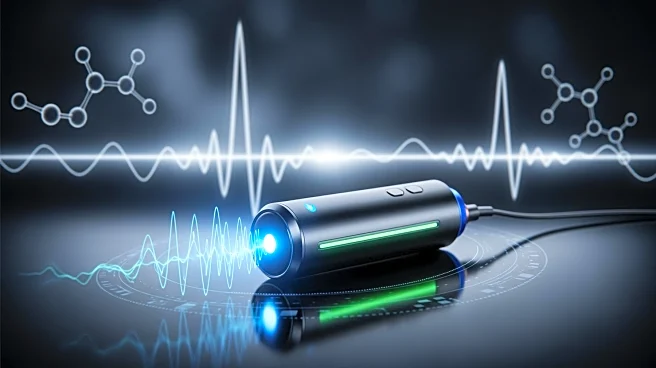What's Happening?
Recent advancements in quantum biosensing are poised to transform healthcare diagnostics, as detailed in a Nature Reviews Physics commentary by Alessandra Lo Fiego, Felix Donaldson, Umesh Vivekananda, Mete Atatüre, John J.L. Morton, and Molly M. Stevens.
The review highlights emerging technologies that leverage quantum phenomena, such as nitrogen-vacancy centers in nanodiamonds, luminescent organic radicals, and MXene quantum dots, to achieve ultrasensitive detection of biological signals. These technologies promise enhanced diagnostic capabilities and functional biological imaging at scales previously unattainable with classical methods. Quantum biosensing aims for sensitivity at the single-molecule level, offering potential for earlier disease diagnosis and more effective personalized medicine. Key technologies include nanodiamond sensors achieving sensitivities down to zeptomolar concentrations, and optically pumped magnetoencephalography for improved spatial resolution.
Why It's Important?
The advancements in quantum biosensing have significant implications for the healthcare industry, potentially revolutionizing diagnostics and personalized medicine. By achieving sensitivity at the single-molecule level, these technologies could enable earlier detection of diseases, improving patient outcomes and reducing healthcare costs. The non-invasive nature of quantum sensors, such as those used in magnetoencephalography, offers improved spatial resolution, which is crucial for accurate diagnostics. Furthermore, the development of biocompatible integrated chips like the Q-BiC platform allows real-time monitoring of cellular processes, enhancing our understanding of biological mechanisms. These innovations could lead to breakthroughs in drug discovery and fundamental biological research, driving progress in medical science.
What's Next?
While quantum biosensing is still largely in the research phase, efforts are underway to translate these technologies into clinical applications. Researchers are focusing on overcoming challenges such as sensor stability, biocompatibility, and signal processing complexity. Funding initiatives, like the UK's Quantum Biomedical Sensing Research Hub, are accelerating progress towards widespread adoption. Future directions prioritize biocompatibility and long-term stability, with researchers investigating novel coatings and surface modifications to minimize immune responses and biofouling. Additionally, exploring multi-parameter sensing promises a more comprehensive understanding of biological processes, requiring sophisticated signal processing algorithms and integrated sensor arrays.
Beyond the Headlines
Quantum biosensing presents ethical and legal considerations, particularly regarding data privacy and the potential for misuse of sensitive health information. As these technologies advance, regulatory frameworks will need to address these concerns to ensure patient confidentiality and ethical use. The long-term impact of quantum biosensing could extend beyond healthcare, influencing fields such as environmental monitoring and security, where precise detection capabilities are valuable. The integration of quantum sensors with existing biomedical devices may also drive innovation in medical technology, fostering interdisciplinary collaboration and new business opportunities.















